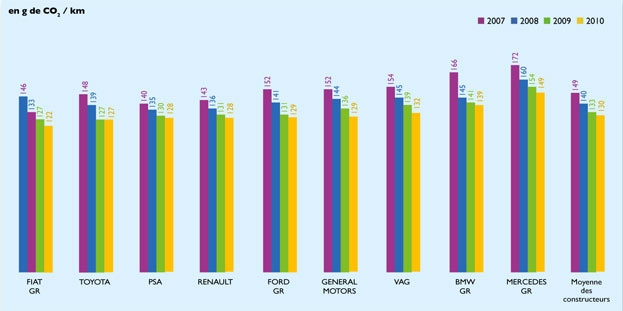Clean cars: French manufacturers are overtaken by Fiat and Toyota
Six manufacturers achieved last year, on the French market, the average emission target of 130 gr of CO2 / km set by Brussels. Fiat and Toyota are ahead of Renault, PSA and Ford for compliance with this standard which favors manufacturers of small cars.
European CO2 regulations are starting to bear fruit. In 2010, six car manufacturers achieved the target of an average emission level of 130 grams of CO2 per kilometer set for 2015, at least with regard to their range sold on the French market.
This rule, more favorable to manufacturers of small cars than to those of large sedans, is now respected by Fiat (122 grams), followed by Toyota (127 grams), according to data published yesterday by Ademe (Agence de l ' environment and energy management).
These two companies have taken the lead in the rankings at Renault and PSA, which have long been the most virtuous in terms of CO2 emissions. It must be said that the Japanese manufacturer ranks its hybrid range (Auris and Prius) at the top of the Ademe classification and that the transalpine group gains points with its Fiat 500 TwinAir.
Ford and General Motors, with its Opel brand, also fell below the threshold beyond which manufacturers can be penalized from 2012. In 2009, only three manufacturers released on average less than 130 grams of CO2 per kilometer on the their entire fleet is a sign of the efforts made by the automotive sector to achieve European objectives.
The study highlights clear progress in the high-end segment. "BMW is the one who has made the greatest efforts," notes Patrick Coroller, head of the transport and mobility department at Ademe. Car manufacturers will begin to suffer financial sanctions from 2012, i.e. 95 euros per gram of CO2 emitted above the authorized threshold.
France in second place
The European average of carbon dioxide (CO2) emissions fell by 45 grams in 15 years and by 5 grams in 2010. France, in second place with 130 grams of CO2 per kilometer traveled, has made more efforts in ten years as Italy and Spain. Germany, if it has reduced its average consumption by 22 grams in ten years, remains one of the most emitting European countries.
According to this list, the Smart Fortwo comes out on top in the diesel category, as in 2009, with 86g of CO2 per kilometer. For “petrol” vehicles, it is the hybrids Toyota Auris and Toyota Prius which rise to the forefront of the “car labeling” of the Ademe with 89 grams of CO2 per kilometer.
For more information see the Ademe VP guide
https://www.econologie.info/share/partag ... aHSEeV.pdf
Source: http://www.lesechos.fr/entreprises-sect ... 173737.php
Electric cars must have largely contributed to the decline in the average ... whose CO2 emissions are unbeatable on paper but in reality they depend on the type of electricity used ... therefore the place / country of recharging ...
See detailed calculation here: https://www.econologie.com/forums/taux-de-co ... 10722.html

